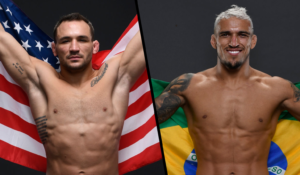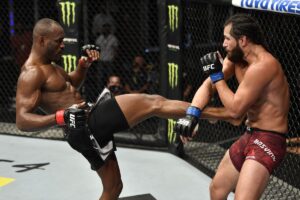Dear UFC, Keep MMA Violent
In an era of padded corners and red tape, let’s keep cage fighting nasty.

Reputation-based refereeing is a noteworthy aspect of our sport. Big fights will feature more generous refereeing. Fighters who are heralded for specific attributes, be it their status as a legend, hyper-durable, a lethal striker, etc., will experience partial refereeing that caters to their respective status. These discrepancies are tacitly acknowledged as a thread in the sport’s fabric.
For the remaining fighters who do not reap the benefits of reputation, I have long said, “If you don’t want a fight to get stopped, don’t get hurt.” It’s not that I believe the route to success to be so simple, but that the determinations of a referee are so severe. In this volatile sport, where victory and defeat dance in the narrowest margins, a referee’s determination can function as a stick of dynamite.
Rafael Fiziev glides into the pocket before launching a lightning-quick three punch sequence. A left hook rips the midsection of Renato Moicano, followed by a right hand to the jaw that buckles his knees. A scorching left capitalizes the combination and sends the Brazilian tumbling.
Chris Tognoni could be mistaken for trying to hail a bus, running and waving his hands while yelling “stop!”, as Fiziev follows Moicano’s cascading body to the canvas. The Tiger Muay Thai product lands a follow-up blow before Tognoni arrives and physically separates the two.
Moicano protests. He can be seen staggering to his feet and losing balance. Such a display constitutes a justifiable stoppage. Moicano, however, could be seen establishing wrist control and shifting his hips while Fiziev crashed into his guard. This exemplifies a fighter intelligently defending themselves. Therein, we have a contradiction.
Tognoni didn’t do anything wrong by stopping the bout, even if the fighter in question was capable of continuing. The impact of Fiziev’s punches could be heard through the screen. They must have been excruciating from within the octagon, unleashed by a highly acclaimed striker, and landing upon the chin of a man who had lost by (T)KO in two of his last three contests.
The above notwithstanding, if a fighter has phenomenal recovery ability, how do we know that if the fight ends as soon as they are dropped? If a fighter is a skillful BJJ player, how are we to judge their susceptibility to getting knocked down compared to that of a less confident grappler? Recall Fabricio Werdum’s ploy to coax Fedor into his guard.
I begin to wonder about a talented yet beleaguered fighter in Moicano, who was (T)KO’d by Jose Aldo while still on his feet, and now had the plug pulled quickly against a dangerous Fiziev. What if Moicano was given the same treatment as a Diaz brother, Frankie Edgar, or Glover Texeira, all of whose careers have been shaped by patient referees?
In a sport so unforgiving as prizefighting, the outcome must be left squarely in the hands of its competitors. A referee’s job is to determine when a fighter is no longer intelligently defending themselves. This happens in isolation from the perceived trauma of a given exchange. Does awaiting a fighter’s defensive response risk additional damage? Absolutely.
Last I checked, this is the hurt business.



